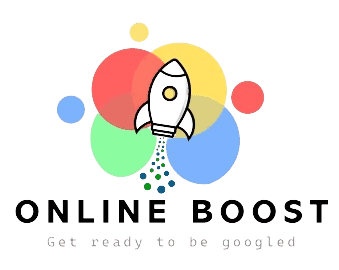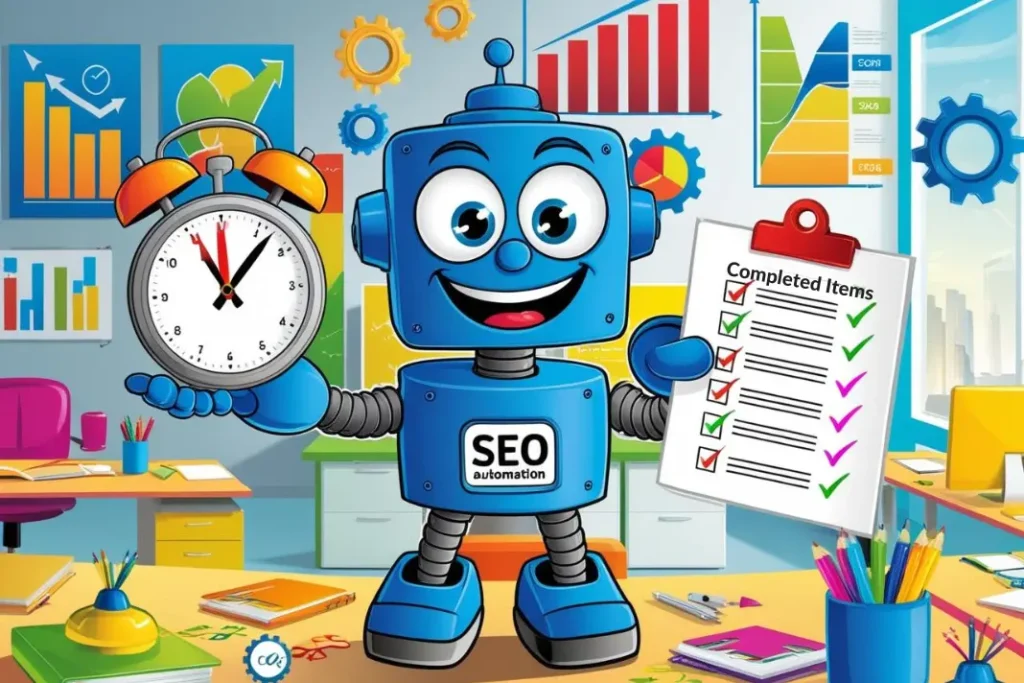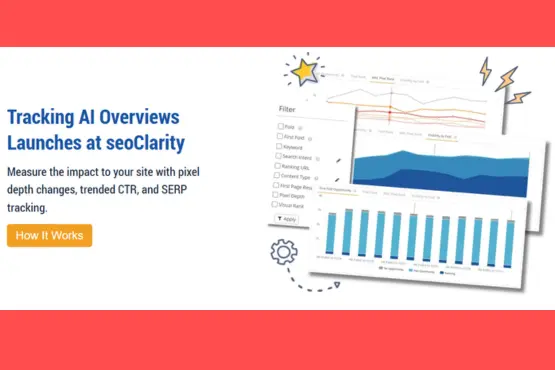Digital marketing success hinges on effective search engine optimization. As Google processes over 3.5 billion searches daily, businesses must maintain a solid online presence to remain competitive. The challenge lies not in understanding SEO’s importance but in managing its countless moving parts efficiently. Manual SEO management has become virtually impossible as websites grow and search algorithms become more complex. Modern businesses need automation to handle the scale and complexity of contemporary SEO requirements. The best SEO automation tools transform overwhelming manual processes into streamlined operations, allowing marketing teams to focus on strategy rather than routine tasks.
This guide will help you understand SEO automation fundamentals, explore how it transforms traditional workflows, and choose the right tools for your needs. We’ll examine actual implementations and results, helping you make informed decisions about your SEO automation strategy.
What is SEO Automation?
SEO automation represents the evolution of search optimization from manual effort to sophisticated software solutions. Automation tools handle these repetitive tasks continuously and systematically rather than having team members individually check website elements, track rankings, or analyze competitors.
Consider a typical scenario: A medium-sized website might have thousands of pages, each needing regular checks for technical issues, content freshness, and performance metrics.
Reviewing these pages could take weeks, during which new issues might arise. Automation tools complete these checks in hours, providing real-time alerts about problems and opportunities.
This automation extends beyond simple monitoring. Modern tools analyze patterns, predict trends, and suggest specific improvements based on collected data. They serve as a digital workforce that never sleeps, constantly evaluating and adjusting to maintain optimal search performance.
Understanding the SEO Automation Process
SEO automation follows a systematic approach that transforms complex tasks into manageable workflows. This process begins with comprehensive data collection, where tools continuously gather information about your website’s performance, user behaviour, and competitive landscape. Rather than sporadic manual checks, this creates a constant stream of actionable intelligence.
Advanced algorithms process this raw data during analysis to identify patterns and anomalies. For instance, when a tool detects unusual traffic drops on specific pages, it automatically investigates potential causes like technical issues, content problems, or ranking changes. This immediate response helps prevent minor issues from becoming major setbacks.
The implementation and monitoring stage puts insights into action. When tools identify issues or opportunities, they either make automated adjustments or provide detailed recommendations for human review. This creates a proactive approach to SEO, addressing problems before they impact rankings and identifying opportunities while they’re still fresh.
Benefits of Using SEO Automation Tools
Time Efficiency and Resource Allocation
Time efficiency stands as the primary advantage of SEO automation. Marketing teams often spend countless hours on repetitive tasks that automation handles in minutes.
Take the example of Fresh Grocers, an online supermarket that previously dedicated three team members to manual SEO tasks. After implementing automation, they reduced their SEO maintenance time by 80%, allowing their team to focus on strategic growth initiatives.
Resource allocation improves dramatically with automation. Instead of spreading team members thin across routine tasks, companies can direct their expertise toward creative problem-solving and strategy development.
A marketing manager at a mid-sized tech firm reported that automation freed up 25 hours per week – time previously spent on manual rank tracking and technical audits.
Improved Accuracy and Reduced Human Error
Human error poses a significant risk in manual SEO work. Even meticulous professionals can miss details when reviewing thousands of pages or data points. Automation eliminates these inconsistencies by applying the same thorough analysis every time.
Consider how a major news website reduced its technical SEO issues by 94% within three months of implementing automated checks – catching errors their manual processes had missed for years.
The consistency of automated systems extends beyond error detection. These tools maintain unwavering attention to detail across all monitored elements, from meta tag formatting to internal link structures. This systematic approach ensures nothing slips through the cracks, which is particularly crucial for large websites with complex structures.
Enhanced Scalability for Growing Businesses
As businesses grow, their SEO needs expand exponentially. A company might start with a hundred pages but quickly grow to thousands, making manual management impossible. Automation scales effortlessly with this growth, maintaining the same level of attention regardless of size.
Take the case of TechStart Solutions, which grew from 500 to 10,000 pages in a year. Their automated SEO system adapted immediately, while their competitors struggled to maintain quality with manual processes.
Scalability also means handling increasingly complex SEO requirements. Modern search algorithms consider hundreds of ranking factors, and manually tracking them becomes overwhelming. Automated systems monitor these factors simultaneously, adjusting strategies as search engines evolve.
This adaptability is especially valuable during significant algorithm updates when quick adjustments preserve rankings while competitors scramble to respond.
The Evolution of SEO Automation
The landscape of SEO automation continues to evolve, driven by advances in artificial intelligence and machine learning. Early automation tools simply gathered data and generated reports. Today’s systems provide predictive analytics, suggesting actions before problems arise.
This proactive approach significantly shifts from reactive SEO management to strategic optimization.
Recent developments in natural language processing have particularly transformed content optimization.
Modern tools analyze content context and user intent, moving beyond simple keyword matching. This sophisticated analysis helps create content that serves user needs while maintaining search engine visibility.
Analyzing the Best SEO Automation Tools
Feature Comparison Matrix
| Tool | Best For | Price Range | Key Feature | Learning Curve |
|---|---|---|---|---|
| seoClarity | Enterprise | $3,000+ | AI Assistant | Moderate |
| Semrush | All-in-One | $129-$499 | Comprehensive | Steep |
| Ahrefs | Research | $99-$999 | Backlink Analysis | Moderate |
| Surfer SEO | Content | $89-$299 | Real-time Optimization | Easy |
| Clearscope | Writers | $170+ | Content Briefs | Easy |
| SEOptimer | Technical | $19-$59 | Site Audits | Easy |
| Letterdrop | Production | Custom | Content Automation | Moderate |
| BuzzSumo | Research | $199-$499 | Trend Analysis | Easy |
| AnswerThePublic | Questions | $99-$199 | Search Intent | Easy |
seoClarity: Enterprise-Level Intelligence
In the enterprise SEO landscape, SEOClarity stands out through its sophisticated approach to automation. The platform’s AI-driven system transforms how large organizations handle SEO operations. Unlike straightforward tools focusing on basic metrics, seoClarity provides deep insights across massive websites.
Consider how a significant retailer used seoClarity to analyze 2 million product pages. Traditional methods would have taken months, but seoClarity completed this analysis in under 24 hours.
The system identified critical issues affecting product visibility and suggested prioritized fixes based on potential revenue impact.
This level of analysis proves particularly valuable for enterprises managing multiple brands or websites simultaneously.
The platform’s real strength lies in turning complex data into actionable insights. Rather than overwhelming users with information, it presents transparent, prioritized recommendations. A global publishing company used these insights to increase organic traffic by 43% across their network of sites, demonstrating the tool’s effectiveness at scale.
Semrush: Comprehensive SEO Intelligence
Semrush approaches SEO automation from a different angle, focusing on providing comprehensive insights across all aspects of search marketing. The platform stands out in connecting various SEO elements into a coherent strategy.
A mid-sized marketing agency demonstrates Semrush’s effectiveness. They used the platform to analyze their client’s market position and discovered untapped opportunities their competitors had missed. The automated competitive analysis revealed 300+ high-value keywords their clients weren’t targeting. Within three months of implementing these findings, their client’s organic traffic increased by 45%.
The platform’s strength lies in its ability to automate complex research processes. Instead of spending hours manually comparing websites and analyzing keywords, users receive automated insights about market gaps and opportunities. This automation extends to technical SEO, content optimization, and link building, creating a unified approach to search optimization.
Ahrefs: Deep Competitive Analysis
Ahrefs transforms competitive research from a time-consuming manual process into a streamlined, automated workflow. The platform excels at revealing competitors’ successful strategies and identifying growth opportunities.
A SaaS startup exemplifies Ahrefs’ effectiveness. They used the platform to analyze their top three competitors’ content strategies.
The automated analysis revealed 50 high-potential keywords their competitors had overlooked. Within six months, they ranked for 40% of these keywords, dramatically increasing their market visibility.
The platform’s backlink analysis capabilities set it apart. Rather than manually tracking link acquisition, users receive automated alerts about new competitor backlinks and lost opportunities. This real-time monitoring allows quick responses to market changes and proactive link-building strategies.
Surfer SEO: Revolutionizing Content Optimization
Surfer SEO transforms content optimization from subjective guesswork into a data-driven science. The platform analyzes top-performing content in real-time, providing writers and editors with actionable insights during creation. This immediate feedback loop dramatically improves content performance before publication.
A content marketing team at a healthcare company demonstrates Surfer’s impact. Previously, they struggled with inconsistent search performance across their medical articles.
After implementing Surfer’s real-time optimization system, they saw a 67% increase in organic traffic within two months. The platform’s NLP analysis helped them maintain medical accuracy while improving search visibility.
The tool’s correlation analysis sets it apart from basic content optimization systems. Instead of focusing solely on keyword density, Surfer simultaneously examines hundreds of ranking factors. This comprehensive approach helps create content that aligns with search intent while maintaining editorial quality.
Clearscope: Elevating Content Strategy
Clearscope approaches content optimization differently, focusing on the entire content creation workflow rather than just final optimization. The platform transforms how teams plan, create, and optimize content by integrating SEO considerations throughout the writing process.
A B2B software company’s experience highlights Clearscope’s effectiveness. Their blog struggled with inconsistent rankings despite producing high-quality content. After implementing Clearscope’s content briefs and optimization processes, they increased their first-page rankings by 380% over six months.
The key lay in how the platform helped writers understand and address user intent before content creation began.
Clearscope’s ability to balance SEO requirements with content quality makes it particularly valuable. Rather than forcing awkward keyword placement, the platform suggests natural ways to incorporate relevant terms and topics. This approach results in content that serves both search engines and readers effectively.
SEOptimer: Mastering Technical SEO
SEOptimer transforms technical SEO auditing from a periodic task into a continuous improvement process. Unlike tools that simply identify issues, SEOptimer provides contextual solutions and prioritizes fixes based on potential impact.
Consider how an online retailer used SEOptimer to revamp their technical SEO. The platform identified 89 critical issues affecting their site’s performance, from slow-loading pages to broken internal links. Following SEOptimer’s prioritized recommendations, they improved page load times by 34% and saw corresponding improvements in search rankings.
The platform’s continuous monitoring capabilities prevent technical issues from accumulating. Rather than waiting for quarterly audits to discover problems, teams receive immediate alerts when issues arise. This proactive approach helps maintain consistent site health and prevents ranking drops before they occur.
Letterdrop: Streamlining Content Operations
Letterdrop addresses a crucial challenge in modern SEO: scaling content production without sacrificing quality. The platform transforms how teams create, optimize, and manage content through intelligent automation. Unlike traditional content management systems, Letterdrop integrates SEO considerations throughout the content lifecycle.
A technology startup’s experience illustrates Letterdrop’s impact. Their team struggled to maintain consistent content output while ensuring SEO optimization. After implementing Letterdrop’s automated workflows, they transformed their weekly team meetings into optimized blog posts, reducing content production time by 60%.
The platform’s ability to convert video content into SEO-optimized articles proved particularly valuable for their technical team members who preferred speaking over writing.
What sets Letterdrop apart is its approach to content automation. Rather than focusing solely on optimization, the platform streamlines the entire content creation process. Teams can maintain editorial calendars, manage approvals, and track performance metrics within a single system, making maintaining consistent quality across all content easier.
BuzzSumo: Understanding Content Performance
BuzzSumo revolutionizes content research by providing deep insights into what content resonates with specific audiences. The platform moves beyond basic metrics to reveal why certain content succeeds while similar pieces fail. This understanding proves invaluable for creating content strategies that drive engagement and rankings.
A lifestyle brand’s transformation demonstrates BuzzSumo’s effectiveness. They struggled to stand out in a crowded market until they used BuzzSumo’s trend analysis to identify underserved topics in their niche. By focusing on these opportunities, they achieved a 156% increase in social shares and 89% growth in organic traffic. The key lay in BuzzSumo’s ability to identify trending topics before they peaked.
The platform’s strength lies in its comprehensive approach to content analysis. Rather than focusing solely on SEO metrics, BuzzSumo examines social engagement, backlink acquisition, and content formats. This holistic view helps teams create content that performs well across all channels, not just search engines.
AnswerThePublic: Mastering Search Intent
AnswerThePublic transforms keyword research by focusing on the questions and concerns driving user searches. This approach helps create content that directly addresses user needs, improving rankings and engagement. The platform reveals people’s language when seeking information, enabling more effective content targeting.
A healthcare website’s experience highlights AnswerThePublic’s value. They used the platform to develop their patient resource centre, analyzing thousands of health-related queries to understand common concerns and questions.
This research led to a 45% increase in featured snippet appearances and significantly higher engagement rates. The content resonated because it answered real questions in users’ natural language.
The platform’s visual presentation of search data sets it apart from traditional keyword tools. Rather than presenting simple lists, AnswerThePublic creates comprehensive question maps that reveal relationships between search terms. This visualization helps content teams understand the broader context of user searches and create more comprehensive content.
Choosing the Right SEO Automation Solution
Selecting the appropriate SEO automation tools requires more than comparing feature lists or prices. The decision should align with your organization’s needs, resources, and growth objectives. Understanding this complex decision process helps prevent costly mistakes and ensures successful implementation.
| Type | Requirements |
|---|---|
| Startups | • Limited funds • Small team • Basic expertise • Core functions • Simple interface • Basic support |
| Mid-Size | • Moderate budget • Growing team • Mixed expertise • Advanced tools • Custom reports • Priority support |
| Enterprise | • Strategic budget • Large teams • Expert users • Full automation • API access • 24/7 support |
Implementation Strategies for Success
Implementing SEO automation tools requires careful planning and systematic execution. The transition from manual processes to automated systems often challenges existing workflows and team dynamics. Success depends on managing this change effectively while maintaining operational continuity.
Global Commerce, an e-commerce platform, provides an instructive example of effective implementation. They adopted a phased approach rather than switching all processes to automation simultaneously. They began with technical SEO automation and expanded to content optimization and competitive analysis. This measured approach allowed team members to adapt while maintaining productivity.
Training proves crucial during implementation. The most sophisticated automation tools provide little value if team members cannot effectively use them.
Progressive Medical Group developed a comprehensive training program alongside their tool implementation, resulting in 90% team adoption within three months. Their success stemmed from focusing on practical applications rather than feature lists.
The Future of SEO Automation
The landscape of SEO automation continues to evolve, driven by advances in artificial intelligence and machine learning. These technologies transform how we approach search optimization, moving from reactive to predictive strategies. Understanding these trends helps organizations prepare for future changes and opportunities.
Machine learning algorithms increasingly power sophisticated analysis tools. These systems can now predict ranking changes before they occur, enabling proactive optimization strategies. For example, the Financial Times’ digital team uses predictive analytics to identify content requiring updates before performance metrics decline, maintaining consistent search visibility across their vast article database.
Natural language processing advances particularly impact content optimization. Modern tools understand context and user intent at unprecedented levels, moving beyond simple keyword matching. This sophistication helps create content that serves user needs while maintaining search engine visibility.
Measuring ROI from SEO Automation
Understanding the return on investment from SEO automation requires looking beyond simple ranking improvements. The true value emerges from a comprehensive direct and indirect benefits analysis. Organizations often discover that automation’s impact extends far beyond their initial expectations.
Digital First Media’s experience illustrates this comprehensive impact. Initially, they tracked only ranking improvements to measure their automation investment. However, after implementing detailed analytics, they discovered their SEO automation tools reduced staff overtime by 72% and improved content team productivity by 45%.
The combination of improved rankings and operational efficiency delivered ROI exceeding 300% within the first year.
Time savings often translate directly to revenue opportunities. Market Leaders, a B2B consulting firm, redirected time saved through automation into content creation and client acquisition.
This shift generated an additional $180,000 in annual revenue while maintaining their team size. Their success demonstrates how automation’s benefits compound when teams reinvest saved resources effectively.
Overcoming Common Implementation Challenges
Data Integration
| Issues | Solutions |
|---|---|
| • Incompatible platforms • Data format mismatches • API limitations • Historical data migration • Real-time sync problems |
• Phased integration approach • Temporary manual bridges • Document data flows • Stage-by-stage testing • Maintain backups |
Team Resistance
| Issues | Solutions |
|---|---|
| • Job security fears • Workflow disruption • Learning curve anxiety • Process change resistance • Tool complexity fears |
• Team Involvement • Task enhancement focus • Regular training • Simple automation start • Early win celebration |
Technical Implementation
| Issues | Solutions |
|---|---|
| • Server compatibility • Resource limitations • Security concerns • Performance impacts • Integration conflicts |
• System audits • Test environments • Performance monitoring • Rollback plans • Config documentation |
Resource Management
| Issues | Solutions |
|---|---|
| • Budget constraints • Limited expertise • Time management • Staff availability • Training Resources |
• Resource planning • Feature priorities • Vendor support use • Internal champions • Phased rollouts |
Process Adaptation
| Issues | Solutions |
|---|---|
| • Workflow disruptions • Reporting changes • Communication gaps • Task confusion • Quality concerns |
• Process mapping • Transition plans • Clear communication • Define roles • Set benchmarks |
Developing a Long-term Automation Strategy
Successful SEO automation requires thinking beyond immediate needs to develop sustainable, scalable solutions. Organizations must balance current capabilities with future requirements while maintaining flexibility to adapt to search engine changes and market evolution.
Consider how Enterprise Analytics approached its automation strategy. Rather than focusing solely on pain points, they mapped out a three-year progression plan.
This included the initial implementation of basic automation tools, gradual expansion into advanced features, and eventual integration of machine learning capabilities. Their methodical approach ensured steady progress while preventing overwhelm.
The key lies in building adaptable frameworks rather than rigid systems. Pacific Digital’s strategy emphasizes tool evaluation every six months, allowing them to adjust their automation stack as new technologies emerge and requirements change. This flexibility helps them maintain a competitive advantage while controlling costs.
Conclusion: The Future of SEO Success
As search engines grow more sophisticated, manual SEO management becomes increasingly unsustainable. The best SEO automation tools transform overwhelming tasks into manageable processes, allowing organizations to scale their search presence effectively. Success requires choosing the right tools, implementing them thoughtfully, and maintaining adaptability as the digital landscape evolves.
Future success in SEO will belong to organizations that effectively balance automation with human insight. While tools handle routine tasks and data analysis, human strategists must focus on creative solutions and strategic planning. This combination of automated efficiency and human creativity creates sustainable competitive advantages in an increasingly complex search landscape.
Remember that automation serves as a means to an end rather than an end itself. The goal remains to deliver value to users while maintaining search visibility. Organizations that keep this perspective while leveraging automation tools position themselves for long-term success in organic search.
Ready to Transform Your SEO Strategy?
Feeling overwhelmed by SEO automation choices? Let’s simplify your journey. Book a free 30-minute marketing consultation with Online Boost’s SEO experts. We’ll help you:
- Assess your current SEO setup
- Identify automation opportunities
- Choose the right tools for your needs
- Create a customized implementation plan
- Set realistic ROI expectations
➤ Book Your Free 30-Minute SEO Consultation
Transform your SEO challenges into opportunities. Our experts will help you select and implement the perfect automation tools for your unique needs.









